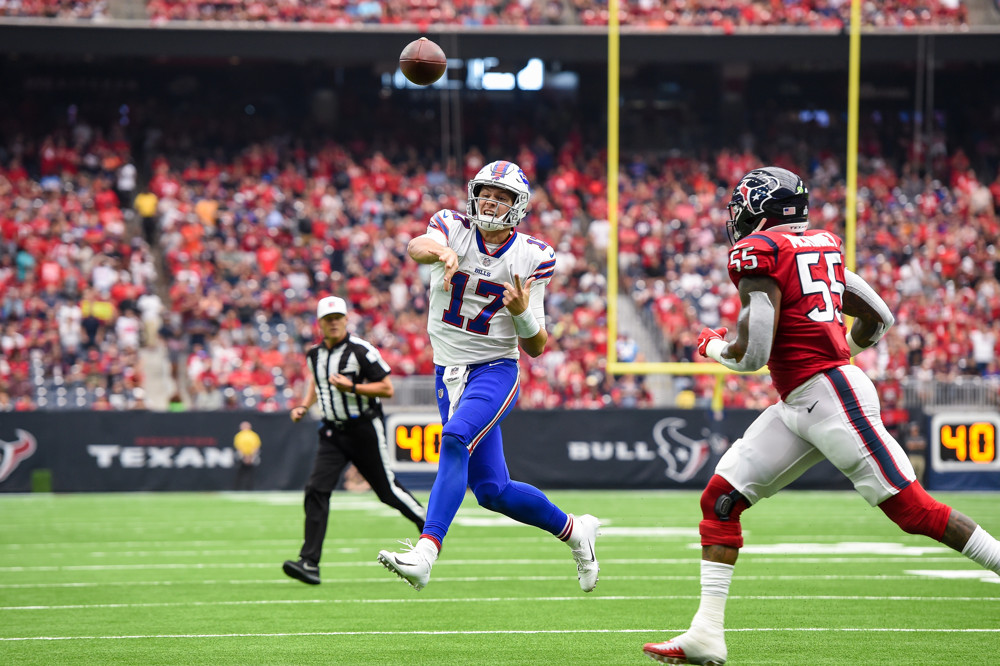Last updated: July 18th at 10:21pm ET.
Bills 2015-2018 Offensive Profile
2015-2018 Pass Attempts Rank: 31st, 32nd, 31st, 28th
2015-2018 Rush Attempts Rank: 2nd, 2nd, 4th, 6th
2015-2018 Play Volume Rank: 20th, 18th, 15th, 19th
2015-2018 Yards Per Play Rank: 8th, 15th, 29th, 31st
Unaccounted for Targets from 2018 (Rank): 169 (8th)
Unaccounted for Carries from 2018 (Rank): 148 (11th)
Projected Starting Lineup
QB: Josh Allen
RB: LeSean McCoy
FB: Patrick DiMarco
WR1: John Brown
WR2: Robert Foster
SLWR: Cole Beasley
TE: Dawson Knox
LT: Dion Dawkins
LG: Quinton Spain
C: Mitch Morse
RG: Spencer Long
RT: Cody Ford
Bills Passing Game
Josh Allen’s rookie season began so rocky he became the weekly subject of internet-meme GIFs before suffering a Week 6 elbow sprain that cost him four games. Allen did flash his ceiling in a Week 3 road upset of the Vikings – he accounted for three TDs, averaged 8.9 yards per attempt, and was a top-five QB1 on the week – and recaptured that flame with a monster Weeks 12-17 finish. Allen outscored the entire quarterback field over the season’s final six weeks, averaging 77.5 rushing yards per game and a very-nice 6.9 yards per pass attempt after managing 5.99 YPA with 54.0% completions in Weeks 1-6. Allen averaged a whopping 9.6 more fantasy points in games where black-hole WR Kelvin Benjamin didn’t play. Buffalo upgraded its pass-catcher corps with perimeter burner John Brown and trusty slot man Cole Beasley and signed seven free agent offensive linemen before trading up for RT Cody Ford early in the second round. Although Allen frustrates visually with erratic ball placement, his on-field aggressiveness as both a runner and passer and improved supporting cast make Allen a highly underrated late-round QB pick.
The Bills signed John Brown to a three-year, $27 million deal to inject deep speed into their offense after Allen attempted the NFL’s highest rate of 20-plus-yard passes (19.7%) as a rookie but completed just 29% (18/63). Brown is a 4.34 burner whose 2018 Average Depth of Target (17.1 yards) ranked sixth highest in the league. Brown was on pace for a 60/1,068/7 (17.7 YPR) receiving line through nine games until Lamar Jackson replaced Joe Flacco in what became the NFL’s run-heaviest offense, and Brown disappeared down the stretch. Even as Brown was a solid real-life addition by Buffalo, Allen’s wildness as a passer and the Bills’ run-first mentality limit Brown’s appeal to the late rounds of best-ball drafts.
Robert Foster, Cole Beasley, and Zay Jones round out Buffalo’s top-four receivers, the former offering the highest ceiling after Foster showed a legitimate stretch-run rapport with Allen. Including a Week 10 Matt Barkley spot start, Foster logged a 57/1,168/7 (20.4 YPR) full-season pace over the Bills’ final seven games and led all rookies in yards per route run (2.06). Foster’s job security isn’t assured – he is a one-trick 4.41 burner who went undrafted and literally got cut last October – but his big-play ability meshed with Allen’s aggressiveness make Foster an enticing late-round fantasy pick. Beasley’s four-year, $29 million addition casts doubt on Jones’ role. Both work best in the slot, while Brown and Foster excel outside.
As three-year, $18.75 million pickup Tyler Kroft suffered his third broken foot in less than a year on the first day of OTAs, ex-WR Jason Croom and rookie Dawson Knox are the Bills’ top candidates for early-season tight end snaps. Croom gained 112 yards over Buffalo’s final three games and has the nepotistic benefit of dating owner Terry Pegula’s daughter. Croom (6’5/246) ran 4.74 coming out of Tennessee. The Bills drafted Knox (6’4/254) in the third round after he blazed 4.58 at Ole Miss’ Pro Day. Buried in a talent-rich offense, Knox managed 39 catches and zero touchdowns in 18 college games, but his athleticism hints at upside for more. Only three tight ends drafted in 2019 boast higher SPARQ scores than Knox.
Bills Running Game
LeSean McCoy’s 2018 season was the worst of his ten-year NFL tenure, failing to hold off washed-up Chris Ivory for true feature back duties and finishing with career lows in yards per carry (3.2), rushing yards (514), and yards per touch (3.9). Although Buffalo ranked a lowly 30th in Football Outsiders’ Adjusted Line Yards run-blocking metric, McCoy’s loss of explosiveness was evident on tape and in his average of 2.01 yards after contact per carry, which ranked 55th among 56 qualified backs. At age 31, McCoy should stay stapled to do-not-draft lists as one of the lowest-ceiling picks in any fantasy format.
Buffalo’s crowded backfield further damages McCoy’s outlook with Frank Gore, T.Y. Yeldon, and rookie Devin Singletary threatening for work. Gore is 36, but he ranked 10th among the aforementioned 56 qualifying backs in average yards after contact (3.29) behind a similarly poor Dolphins line and outdid McCoy 50% to 37% in rushing Success Rate. Yeldon, 25, has quietly averaged 794 yards from scrimmage over the last four seasons with 50-plus receptions in two of the last three. He’s the best receiving back on Buffalo’s roster. The Bills surprisingly spent a top-75 pick on Singletary, an undersized (5’8/203) and speed-deficient (4.66) college bellcow whose pass-catching involvement was minor at Florida Atlantic.
2019 Vegas Win Total
The Bills’ Win Total is 6.5, a mark they’ve exceeded in four of the past five years and missed by only a half win last season. Buffalo finally has offensive staff and quarterback continuity with Josh Allen in year two under OC Brian Daboll, and Sean McDermott’s defense has been stingy or better with two-year DVOA finishes of 15th (2017) and 2nd (2018). Facing this year’s fifth-softest schedule based on Opponent Win Totals, I’m taking the Bills to win seven games or more and finish in the .500 range on the year.



